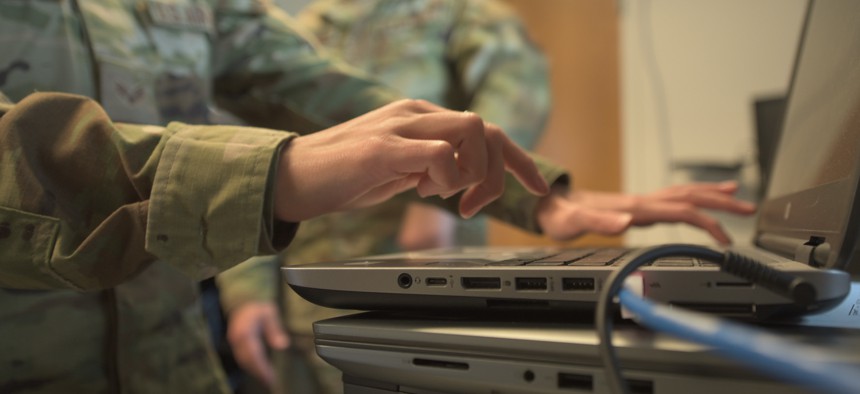Space Force needs more cyber operators for weapons systems, chief says

U.S. Air Force / Staff Sgt. Magen M. Reeves
Protecting weapons platforms is a primary concern for Space Operations Command, says its vice commander.
Protecting weapons systems is a top concern for the U.S. Space Operations Command, but there aren’t enough cyber operators to monitor the myriad interconnected platforms.
“We really need to worry about our weapons systems…because every weapons system talks to another weapons system that talks to another system. So we have to make sure that we are secure,” Maj. Gen. Douglas Schiess, the commander for U.S. Space Command’s Combined Force Space Component Command, told reporters Tuesday during the Air & Space Forces Association’s annual Air, Space & Cyber conference.
“I need to make sure my cyber systems are ready to go at a moment’s notice and that they’re not going to keep me from doing the mission that I need to do.”
Schiess, who is also the vice commander for Space Operations Command, said the command has grown significantly in intel and cyber since the Space Force stood up in 2019.
The command has mission defenders on protected satellite communications systems, such as Advanced HF and Milstar, and on GPS. But Schiess wants more.
“We do not have them on every one we want to, but we are continuing to build those out as we go forward,” he said.
Cyber workforce needs are a challenge felt across the Defense Department, which published a dedicated strategy last month. On Tuesday, the Pentagon released an unclassified summary of its cyber strategy, which highlights workforce needs and names China and Russia as adversaries, since both countries “have embraced malicious cyber activity as a means to counter U.S. conventional military power.” A classified version was sent to Congress earlier this year.
“This is not just a gray zone activity…it also plays a role in conflict itself,” Mieke Eoyang, deputy assistant secretary of defense for cyber policy, told reporters at the Pentagon on Tuesday without offering specifics on how the department would use cyber operations.
The Pentagon’s cyber document refers back to the White House’s national cyber strategy released earlier this year and mentions weapons security twice, vowing to “modernize our cryptographic algorithms across weapons systems, data links, and networks” to deter malicious cyber activity and protect critical weapons systems by developing a holistic approach to “rapid information-sharing and analysis” of threats to the defense industrial base.
Schiess said Space Operations Command focuses its cyber efforts on mission defense and noted that cybersecurity must be ingrained in new systems as they are developed by Space Systems Command—instead of after the fact. Space Operations Command has also prioritized which systems they’d like to have cyber operators for.
“As we bring on new systems, hopefully they come with the cyber defense package. But as we have legacy systems…we still have to defend those,” Schiess said. “We are building up our cyber operators. We do not have enough, but over time, as we continue to grow in the Space Force, we will continue to bring” more on.
The command is also looking at the delineation between space, intelligence, and cyber operators to ascertain whether they could essentially do the same job.
“What's the difference between a cyber operator and a space operator, and can we have them do the same thing? What’s the difference between an intel and a cyber operator? So we will continue to look at that,” he said.



